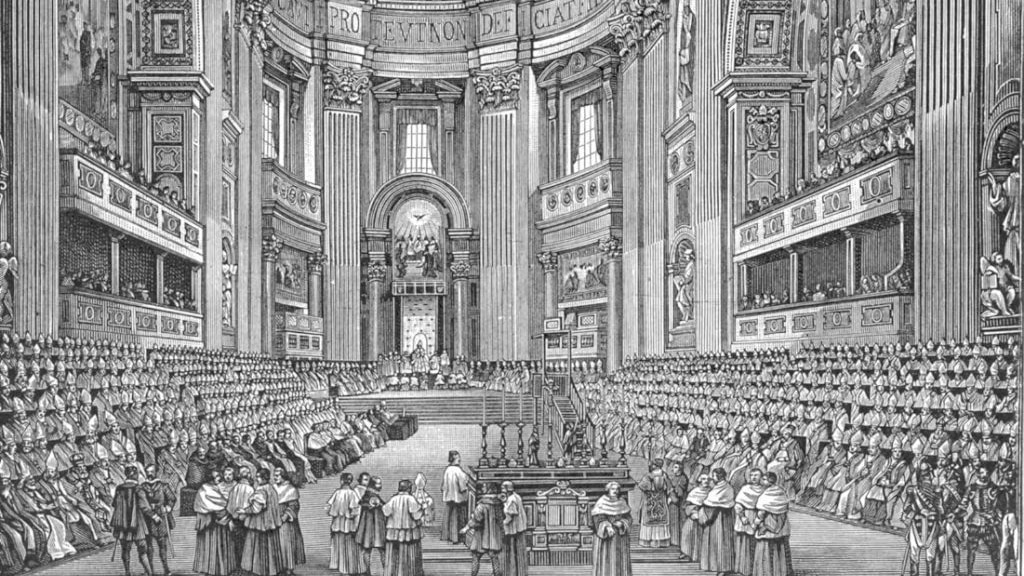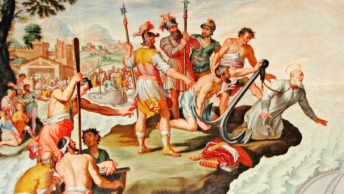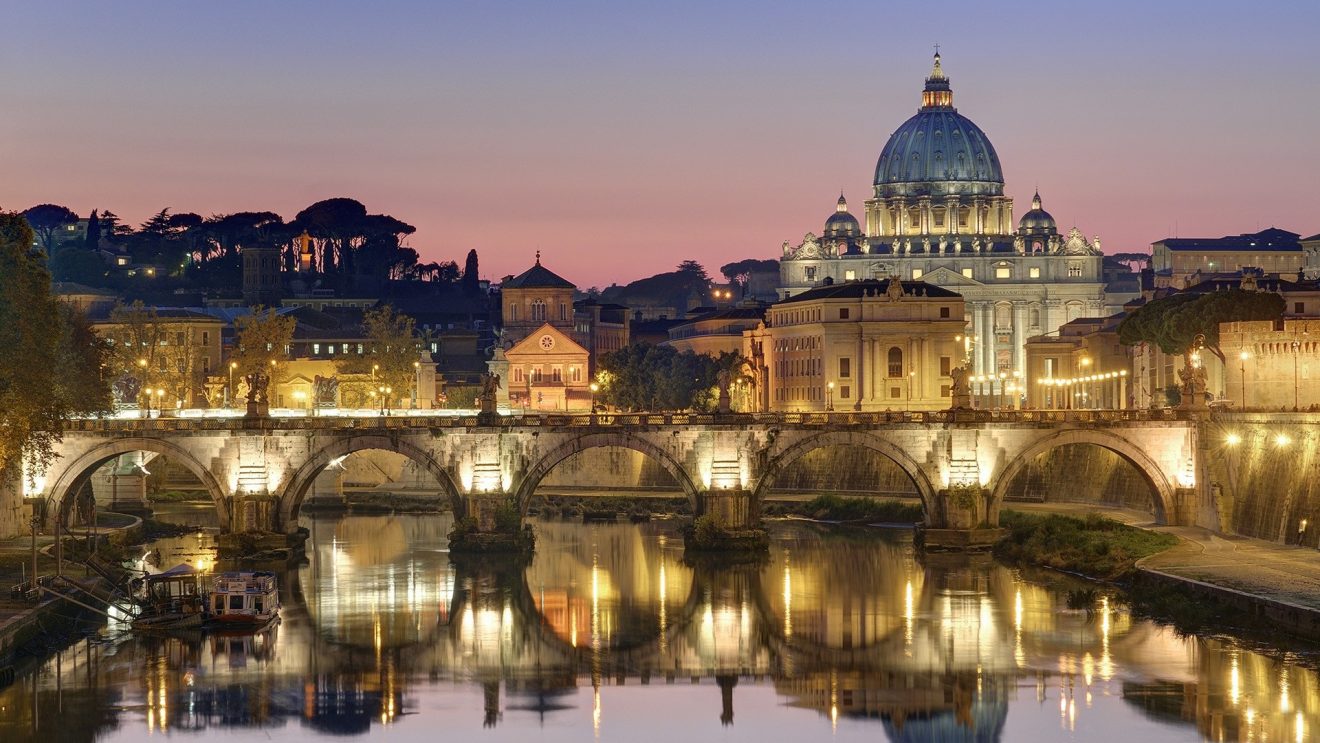My recent essay on the doctrine of Papal Infallibility showed that many popes were mistaken about matters of faith and morals, proving that elevation to the papacy does not exempt one from human imperfection.This fact, I argued, raises questions about the claim of papal infallibility made in Vatican I in 1870. To be sure, the questioning does not deny that Holy Spirit offers guidance; it only suggests that popes may misunderstand, ignore, or reject that guidance.
This essay explains the inflation of infallibility that occurred in 1970, a century after Vatican I. At that time the Catholic Church still claimed that the Pope is infallible when making formal declarations about faith and morals. What was different in 1970 was that secular culture essentially claimed that everyone is infallible about everything. Ironically, this claim was supported by many people that might have been expected to oppose it—specifically, Catholic priests, nuns, and laypeople.
Neither Catholic leaders nor their followers realized that the new belief system directly challenged the Church’s teaching on human imperfection, mainly because the system’s advocates never used the word “infallibility.” They spoke instead of “human potential” and everyone creating his or her own truth and reality, which seemed compatible with both religious and democratic values.
The advocates were neither theologians nor philosophers. They were practitioners of a much newer discipline thought to be more “scientific”(and therefore more believable) than earlier ones. That discipline was the branch of psychology known as Humanistic Psychology (HP). Its most influential members were Carl Rogers and Abraham Maslow. The following quotations from Rogers’ various works illustrate their main principles (the emphases are mine).
“Can we today afford the luxury of having ‘a’ reality? Can we still preserve the belief that there is a ‘real world’ upon whose definition we all agree? I am convinced that this is a luxury we cannot afford, a myth we dare not maintain…It seems unnecessary to posit or try to explain any concept of ‘true’ reality. For purposes of understanding psychological phenomena, reality is, for the individual, his perceptions.”
“The criteria for making value judgments come more and more to lie in the person, not in a book, a teacher, or a set of dogmas. The locus of evaluation is in the person, not outside … We are wiser than our intellects … [and] our organisms as a whole have a wisdom and purposiveness which goes well beyond our conscious thought.”
“When an activity feels as though it is valuable or worth doing, it is worth doing. Put another way, I have learned that my total organismic sensing of a situation is more trustworthy than my intellect.”
“[The client] tends to place the basis of standards within himself, recognizing that the ‘goodness’ or ‘badness’ of any experience or perceptual object is not something inherent in that object, but is a value placed on it by himself.”
“Optimal therapy” for the client “would mean an exploration of increasingly strange and unknown and dangerous feelings in himself . . . and as he lives these widely varied feelings, in all their degrees of intensity, he discovers that he has experienced himself, that he is all these feelings.”
“I would like to treasure the feelings of anger and tenderness and shame and hurt and love and anxiety and giving and fear––all the positive and negative reactions that crop up. I would like to treasure the ideas that emerge––foolish, creative, bizarre, sound, trivial––all part of me. I like the behavioral impulses––appropriate, crazy, achievement-oriented, sexual, murderous. I want to accept all of these feelings, ideas, and impulses as an enriching part of me.”
Rogers had once been president of the American Psychological Association and had won its first Distinguished Scientific Contribution Award. Both he and Maslow were connected with the Western Behavioral Sciences Institute. Rogers’ main associate there was William Coulson, a Catholic who had earned his doctorate at Notre Dame. In “The Story of a Repentant Psychologist,” Coulson discusses what HP did and its unfortunately consequences for the Catholic Church.
Rogers’ and Coulson’s work with HP focused on training “dozens” of Catholic religious orders through encounter groups engaged in Rogerian “self-exploration.” The orders included the Jesuits, Franciscans, Sisters of Providence of Charity, Mercy Sisters, and Immaculate Heart of Mary (IHM) sisters.
Coulson explains that Humanistic Psychology taught the priests and religious to “go against what you were trained to be, to call all of that ‘phoniness,’ and to say what is deepest within you. What’s deepest within you, however, are certain unrequited longings.” He adds that HP “provoked an epidemic of sexual misconduct among clergy and therapists . . . Priests and nuns became bachelors and bachelorettes. They started thinking about conquest . . .They see themselves now as ‘whole persons,’ and they justify their sexualized behavior on the basis of that theory.”
The effect of this teaching, Coulson states, was this: “We overcame their traditions, we overcame their faith.” For example, “The IHMs had some 60 schools when we started; at the end, they had one. There were some 560 nuns when we began. Within a year after our first interventions, 300 of them were petitioning Rome to get out of their vows. They did not want to be under anyone’s authority, except the authority of their imperial inner selves.” Before long there were perhaps “a couple dozen [nuns] left.” [Emphasis added]
“Humanistic psychotherapy,” Coulson writes, “the kind that has virtually taken over the Church in America, and dominates so [much] aberrant education like sex education, and drug education, holds that the most important source of authority is within you, that you must listen to yourself . . . But we didn’t have a doctrine of evil . . . We failed to understand the reality of evil in human life. When we implied to people that they could trust their evil impulses, they also understood us to mean that they could trust their evil impulses, that they really weren’t evil.” [Emphasis added]
Humanistic Psychology became a powerful force not just in secular culture, but in Catholicism as well. In both places its message was the same: You are wonderful, you create your own truth and reality, whatever you think and say and do is wise and good; therefore you owe yourself unquestioning and unlimited love and esteem. For decades that message was delivered directly in schools and colleges, books and magazines, and indirectly in TV news and commentary, and in films. Priests who had learned it in encounter groups or in the seminary preached it from the pulpit and perhaps even referred to it in the confessional. (Go in peace and enhance your self-esteem with diligence!)
HP clearly implied that logic, ethics, moral theology, and even God, are unnecessary. (In a 1962 entry in his journal, Abraham Maslow made this reference to a Catholic group who attended one of his lectures: “They shouldn’t applaud me––they should attack. If they were fully aware of what I was doing, they would.”) Non-religious people tended to acknowledge and embrace HP’s implication. Many Catholics and other believers tended to ignore or reject it in principle, but they nevertheless could not help being influenced by it. The message of Humanistic Psychology shaped school and college curriculums, was communicated in books and essays, and was celebrated in the media.
The Catholic doctrine of infallibility may be mistaken in assuming that a particular human being, the Pope, will necessarily follow the guidance of the Holy Spirit. However, HP’s version of infallibility (that all human beings are inherently wise and good) makes a much more dangerous assumption—that believing we are already unfailingly wise and good will improve our lives and make the world a better place.
Admittedly, Humanistic Psychology’s version of infallibility seems perfectly reasonable at first consideration. What could be fairer (and more democratic) than believing that every one of us possesses his/her own truth and virtue, no one is ever wrong, and there is no genuine basis for disagreement and dissension? However, closer examination of this idea reveals serious flaws. People have different experiences and perceptions, which produce different ideas, beliefs, and values, some carefully examined, others not, some wise and others foolish, and most of them held with conviction. Because of this, no matter how much people say that all ideas are equal, they seldom if ever treat them that way. If fact, those who shout loudest about such equality are often the first not only to condemn views that disagree with theirs but also to demonize those who hold them! As it that were not enough, those who have the least evidence to support their views are often the least tolerant of others’ views.
I submit that the moment a Catholic pope or bishop believes that he is infallible in certain situations—or any other human being believes he/she possesses Humanistic Psychology’s version of infallibility—the following responses are likely to follow:
Loss of interest in seeking evidence to support one’s own views,
Increased disdain for, or outright dismissal of, other people’s views,
Perception of alternative views as offensive to oneself and dangerous to others,
Denunciation of those who disagree and (in some cases verbally abusing them),
Questioning the motives and integrity of such “offenders,”
Demanding that persons with different views be investigated and/or censored,
Initiating legal action against those who disagree and their supporters
The mental/emotional states that underlie each of these reactions are resentment, a sense of obligation toward one’s personal “truth” every bit as strong as the traditional obligation toward the truth, feelings of self-importance and superiority, condescension toward others, entitlement, arrogance, closed-mindedness, and an absence of humility.
Both the responses and the mental/emotional states that prompt them are very much in evidence in our society. Examples of their harmful effects are in the news every day. I believe the only hope for reversing those effects is to return to the traditional Judeo-Christian view that human nature is “fallen” and therefore imperfect, and that no one—cleric or layperson, sinner or saint—is exempt from error. That understanding will help us gain the humility necessary to pursue truth with open minds and meet our neighbors with open hearts.
Copyright © 2022 by Vincent Ryan Ruggiero. All rights reserved







